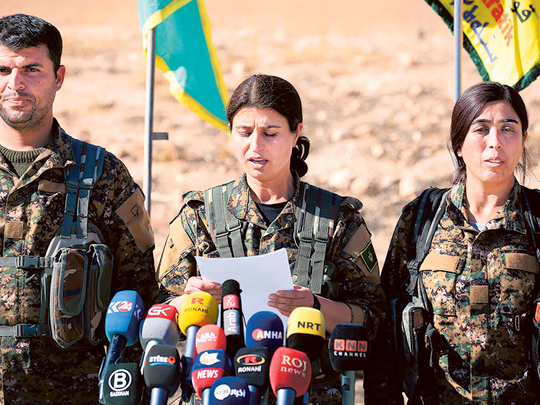
Ain Eisa, Syria: A US-backed alliance of Kurdish and Arab fighters said Sunday it had began a long-awaited operation to capture Daesh’s de facto Syrian capital Raqqa.
“The major battle to liberate Raqqa and its surroundings has begun,” Jihan Shaikh Ahmad, a spokeswoman for the Syrian Democratic Forces (SDF), said at a press conference in Ain Eisa, some 50 kilometres north of the militant bastion.
The operation, dubbed “The Wrath of the Euphrates,” comes as Iraqi forces backed by the US-led coalition press an assault to take the terrorist group’s Iraqi stronghold of Mosul.
Ahmad said the fight would involve some 30,000 fighters and had begun on Saturday night.
“Raqqa will be liberated by its sons and Arab, Kurdish and Turkmen factions, heroes under the banner of the Syrian Democratic Forces, and with the active participation of the (Kurdish) People’s Protection Units ... in coordination with the international coalition” led by Washington, a statement read at the press conference said.
Ahmad said the operation planned to free Raqqa from “the forces of global, obscurantist terrorism represented by Daesh that took (the town) for their presumed capital.”
SDF spokesman Talal Sello said the operation would proceed in two phases, “first liberating the countryside around Raqqa and isolating the city, and secondly taking control of the city.”
He said the SDF had received new weapons from the US-led coalition for the battle, including anti-tank missiles.
“The fight will not be easy, and will require accurate and careful operations because IS [Daesh] will defend its bastion knowing that the loss of Raqqa will mean it is finished in Syria,” he said.
Meanwhile in Iraq, special forces battled Daesh militants inside Mosul for the third day running Sunday while civilians risked their lives dodging bombs and snipers to slip out of the city.
The Daesh group put up fierce resistance to defend the city it seized more than two years ago and also claimed responsibility for deadly suicide attacks further south.
The elite Counter-Terrorism Service has been spearheading the attack on the eastern front of the three-week-old offensive on Mosul, Iraq’s largest military operation in years.
“Our forces are continuing to clear neighbourhoods, including Al Samah, Karkukli, Al Malayeen and Shaqaq Al Khadra,” CTS Staff Lieutenant General Abdul Gani Al Assadi said.
The militants have given up some of its bastions in Iraq and Syria with barely a fight in recent months but its men began the defence of their last Iraqi hub with anger.
“Resistance is very heavy and they have suffered major losses,” Al Assadi said of Daesh.
Soldiers from the army’s 9th armoured division also battled militants in the southeastern neighbourhood of Intisar, an AFP correspondent reported, as forces attempted to increase their footprint in eastern Mosul.
The assault allowed some civilians to flee the city, most of whose million-plus residents remained trapped inside, sheltering both from their terrorist rulers and incoming fire from government forces and US-led coalition aircraft.
Some of the first civilians to manage to escape the city proper arrived at a camp near Khazir in Kurdish-controlled territory on Saturday.
Abu Sara dodged gunfire, bombs, mortar rounds and coalition strikes to flee his neighbourhood of Al Samah, such was his desperation to leave what many civilians who escaped Daesh rule describe as an open-air prison.
“We walked several miles, taking with us only the clothes we were wearing and white flags we waved the entire way,” said the 34-year-old, wearing a brown fake leather jacket.
While the corridors called for by aid groups to allow the safe passage of civilians have yet to materialise, arrivals in the displacement camps dotting the area have increased markedly.
The government said it had taken in 9,000 displaced people in the past two days.
The International Organisation for Migration said a total of about 34,000 people had been displaced since the start of the offensive on October 17.
Relief organisations were fighting the clock to build up their shelter capacity ahead of the feared mass exodus from Mosul.
Despite Daesh leader Abu Bakr Al Baghdadi giving his fighters a pep talk on Thursday, urging them not to retreat from Mosul in a rare audio message, the outcome of the battle was in little doubt.
The militants, with an estimated 3,000 to 5,000 fighters in Mosul, could hold out for weeks and inflict heavy casualties on government forces but they are outnumbered about 10 to one.
The group’s ability to hit back with ground offensives elsewhere appears to be gone and Daesh has responded with a string of diversionary attacks, including spectacular operations in Kirkuk and Rutba.
On Sunday, it claimed responsibility for three suicide attacks in Tikrit and Samarra, the two main cities in Salah Al Deen province north of Baghdad.
Iraqi officials spoke of only two bombers, one who detonated an explosives-rigged vehicle at the southern entrance to Tikrit, and another who blew up an ambulance in Samarra.
Jasem Al Jbara, the head of Salah Al Deen province’s security committee, said that the Tikrit attack killed 12 people and wounded 20, while six died and 12 more were injured in Samarra.
Daesh identified two of the bombers as “Al Moslawi” — a nom de guerre that would indicate they were from Mosul, though it could be a propaganda attempt to link militants from other areas with the ongoing battle for Iraq’s second city.
Prime Minister Haider Al Abadi, who has visited the Mosul front lines several times since the offensive started, has vowed to rid the country of Daesh by the end of the year.











